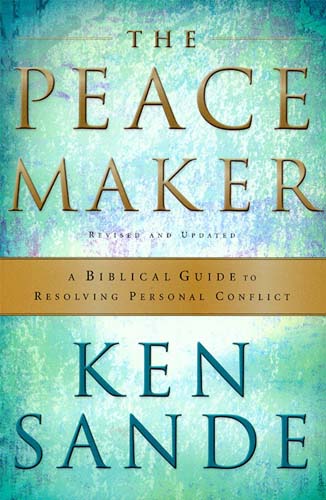 One of the books I wish I’d read at the beginning of my ministry is The Peacemaker by Ken Sande. It is subtitled “A Biblical Guide To Resolving Personal Conflict” and if I’d known about it twenty years ago, it would have saved me a lot of trouble. I now make it a required text for my students and also recently decided to begin my new pastoral ministry by studying it with my congregation in the Adult Sunday School Class.
One of the books I wish I’d read at the beginning of my ministry is The Peacemaker by Ken Sande. It is subtitled “A Biblical Guide To Resolving Personal Conflict” and if I’d known about it twenty years ago, it would have saved me a lot of trouble. I now make it a required text for my students and also recently decided to begin my new pastoral ministry by studying it with my congregation in the Adult Sunday School Class.
Why a priority?
Why make such a book a priority at the beginning of my ministry? First, because conflict will eventually and inevitably arise in every church; and the way we respond to it will make or break the church.
Second, it’s also a “pre-emptive” strike, trying to get ahead of any trouble, so that we have a pattern and model for handling conflict that we can use to keep one another accountable.
And third, it’s to re-teach myself. I was brought up in a large city, Glasgow, and attended large public schools where I learned the infamous Glasgow way of handling conflict – blunt fists or sharp tongues. Not having much in the pecs and biceps department I became quite skilled with the only muscle at my disposal – a sharp, quick, and aggressive tongue.
Tamed but Temptable
Though now considerably tamed by grace, my aggressive, confrontational Glaswegian nature has often resurrected and erupted, damaging myself and others in the process.
On the other hand, aware of my weaknesses in that area, I’ve sometimes over-compensated by avoiding dealing with issues, fearing that I will end up making things worse.
That’s why I need to read Sande again and again, in order to be constantly delivered from my “natural” sinful instincts and to seek spiritual and God-glorifying ways of responding to conflict.
My study guide handout for the introduction and chapter one is here, but I began the class with a general mixture of my own and Sande’s thoughts on conflict and peacemaking.
Conflict is:
- Inevitable: It comes into the best of relationships.
- Helpful: Not all conflict is bad as different perspectives can stimulate productive dialogue, encourage creativity, and promote helpful change.
- Surprising: Sometimes it comes at the most unexpected times from the most unpredictable of people.
- Damaging: Conflict can damage relationships but also mental, spiritual, emotional and physical health.
- Revealing: It brings out the worst in us and exposes our hearts to ourselves and others.
- An opportunity: To learn how to manage oneself in stressful situations and to teach others how to handle conflict.
Peacemaking is:
- Difficult: hard work, goes against our grain.
- Obligatory: Not an option for Christians.
- Hopeful: Can produce even better relationships than what was there before.
- Rare: Uncommon both in the world and the church, therefore opportunity for countercultural witness.
- Healing: restores relationships, improves health.
- Dependent: We need the Holy Spirit in us and in others.
- Modeled: Christ is our model and motivation for peacemaking.
- Conscience-satisfying: even if other person does not respond, we can enjoy the freedom of knowing we tried everything possible to resolve the issue.
Why not get the book and read along with us? I’ll aim to publish the handout here each Monday. It will basically be a summary outline of the chapter with some of my own thoughts thrown in. I’ll highlight what I think are the most important sections and sometimes re-arrange the order. Next week we’ll be looking at chapter 2.